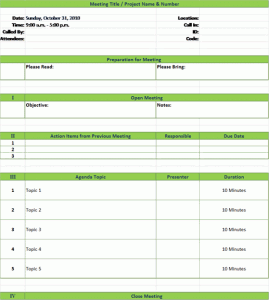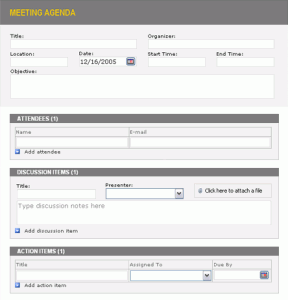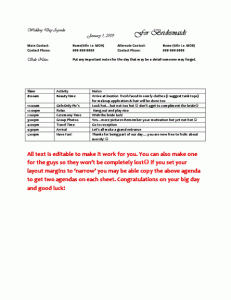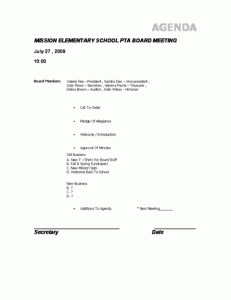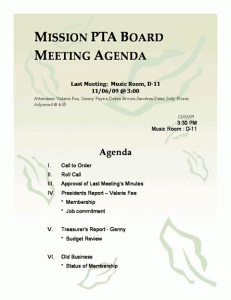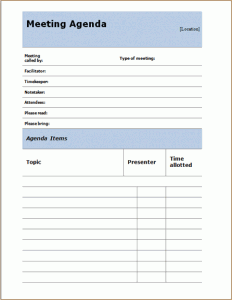16+ Professional Meeting Agenda Templates: Save Time & Stay Focused
During the past several years there has been a tremendous modification and improvement in the methods and strategies of doing business. The processes have been very intelligently streamlined and made systematically through the addition and deletion of some tasks and stages. Goal orientation is the key objective of most business activities. These activities revolve around the process of making sales of key products and services and increasing the magnitude of our customer base.
What is a Meeting and its Agenda?
While performing business activities of various sorts, employees and managers need to arrange meetings and conferences with different individuals and organizations. Such meetings are gatherings and assemblies of certain participants who have common interests and can contribute positively to the achievement of company goals and objectives. Such meetings need to be purposeful and with a specific goal or objective. Such written down goals that are expected to be accomplished from the arrangement of these meetings are known as a meeting agenda. There are several purposes for making a meeting agenda some of which are as stated below:
- The goals and objectives of the meeting are clarified both to the participants and organizers
- The meeting is carried out in one direction and focus on the agenda is maintained
- Wastage of time is avoided
- Valuable resources of the organization are safeguarded
- Common goal achievement is made possible through thinking synergy
Every organization has its meeting agenda template to document its meetings based on their requirements and criteria. Each meeting can have different things or ways to conduct it. And a template to document these meetings could be different. So, based on all these things, we have collected different Meeting Agenda Templates as listed below.
01. Basic Agenda Template
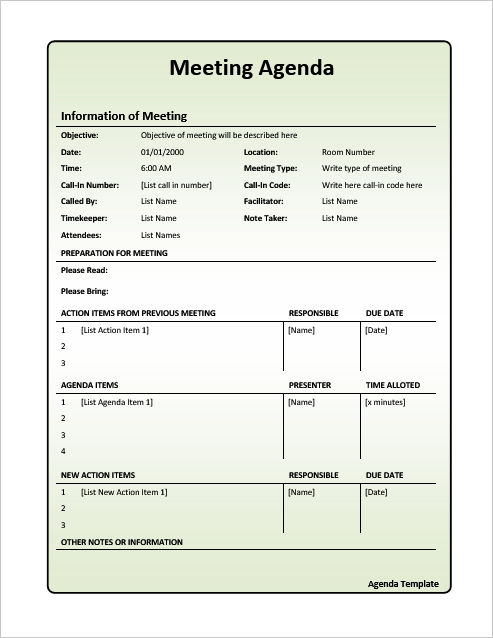
02. Basic Formal Meeting Agenda Template
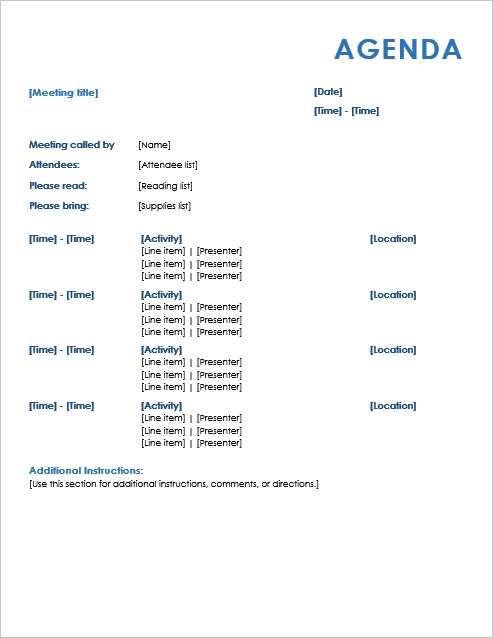
03. Basic Meeting Agenda Planner

04. Basic Meeting Agenda Template

05. Board Meeting Agenda

06. Company Meeting Agenda Template

07. Conference Call Meeting Agenda

08. Detailed Conference Agenda Template

09. Informal Meeting Agenda

10. Meeting Agenda Format

11. Meeting Agenda Template Black and White

12. Meeting Agenda Template with Coloured Background

13. Project Team Meeting Agenda

14. Public Meeting Agenda

15. Seminar Agenda Template

16. Simple Meeting Agenda

Challenges Without an Agenda
- Lack of Focus and Direction: Meetings often meander through various topics without clear objectives or priorities, leading to wasted time and unproductive discussions.
- Time Overruns: Without a guiding framework, meetings frequently run over the allotted time, causing frustration and scheduling conflicts.
- Missed Important Topics: Key issues may be overlooked or inadequately addressed, delaying decisions and leaving important matters unresolved.
- Reduced Accountability: There is often no record of who is responsible for specific tasks, making it difficult to track progress and ensure follow-up.
- Inefficient Use of Participants’ Time: Participants may feel their time is wasted, leading to disengagement and frustration.
- Difficulty in Measuring Outcomes: Without clear benchmarks and goals, it is challenging to measure the meeting’s success or effectiveness.
- Increased Stress and Frustration: The unpredictability and lack of structure can cause stress and lower morale among attendees.
- Poor Preparation: Participants may come unprepared, leading to inefficient and less meaningful discussions.
- Dominance by Certain Participants: More vocal members may dominate the meeting, while quieter participants struggle to contribute.
- Inconsistent Follow-Up: Tasks are often forgotten or missed due to the lack of a documented plan of action.
By addressing these challenges, the necessity of a well-structured agenda becomes clear, ensuring more effective and productive meetings.
← Previous Article
« Elegant & Colorful Happy Birthday Cards Collection